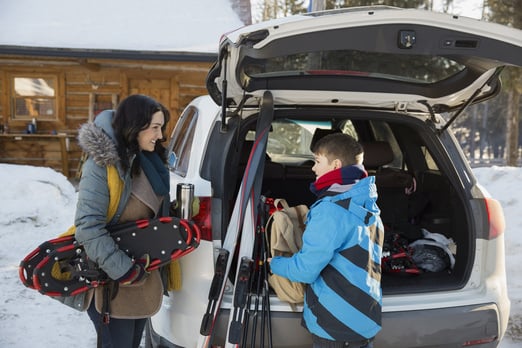Share this
Tips for a Safe and Enjoyable Ski Trip by Car
by Jacqueline Briner on 27.11.24 15:22

Driving to your ski vacation destination gives you flexibility and the convenience of transporting gear easily. But snowy mountain roads and winter conditions mean that careful planning is essential. Here are top tips to make sure your journey to the slopes is as safe and stress-free as possible.
1. Prepare Your Vehicle for Winter Conditions
Make sure your car is fully winter-ready for a safe trip to the mountains.
- Winter Tires: Check that your car is equipped with winter tires; in many alpine countries, they’re required once snow is present. Snow chains may also be necessary in some areas—check the local regulations in advance.
- Antifreeze Levels: Fill your coolant and windshield washer reservoir with antifreeze to protect your car from freezing temperatures.
- Battery and Lights: Cold weather is hard on car batteries, so have yours checked if it’s old. Ensure that headlights are clean and functional, as you’ll likely drive in lower visibility conditions.
2. Bring and Practice Using Snow Chains
Snowy and icy conditions can make roads difficult to navigate, especially in mountainous areas.
- Tip: Practice installing your snow chains before the trip. Many alpine parking areas have designated spaces for putting on chains, but the process will be quicker and easier if you’re already familiar with it.
- Note: Ensure the snow chains are the correct size for your tires and that you have a good instruction guide or manual handy.
3. Pack Thoughtfully for Safety and Space
Loading your vehicle smartly is essential for both safety and comfort.
- Skis and Snowboards: These are best stored in a rooftop box, which frees up space inside the car and keeps them safely secured. Make sure the box is well attached.
- Heavy Items: Pack heavy bags low and close to the back seats to balance the car’s weight and prevent items from moving around if you stop suddenly.
4. Check Weather and Road Conditions Ahead
Mountain weather can be unpredictable, so always monitor road and weather conditions before and during your journey.
- Tip: Many apps and local traffic services, provide up-to-date weather and traffic information. Starting your trip early can help you avoid traffic and give you more daylight for the drive.
5. Carry Emergency Supplies and Snacks
It’s a good idea to bring a few extras in case you face unexpected delays or need to stop.
- Food and Drinks: Bring along snacks and warm beverages. A thermos with hot tea or coffee can be a nice comfort if you’re delayed in cold weather.
- Warm Clothing and Blankets: Extra blankets and winter clothing are helpful if you end up waiting in the car for extended periods.
- Emergency Equipment: An ice scraper, gloves, flashlight, and jumper cables are essential items for winter trips.
6. Plan Regular Breaks to Stay Alert
Long drives in winter conditions can be tiring, especially in snowy landscapes that require focus.
- Tip: Schedule breaks every couple of hours. This helps prevent fatigue, especially when driving in low-light conditions or at night.
Final Thoughts
With good preparation and the right gear, your drive to the ski slopes can be smooth and enjoyable. By ensuring your vehicle is winter-ready, practicing with snow chains, packing wisely, and planning for varying conditions, you’ll be set for a safe and comfortable ski trip. Safe travels and happy skiing!
Share this
- Enterprise Minilease (26)
- News (13)
- Travel (12)
- Top Places Switzerland (9)
- Enterprise GO (8)
- Weekend Trips (8)
- Did you know ? (6)
- Top 10 (6)
- Comparison (4)
- Electromobility (4)
- Future (4)
- Offer (3)
- Tips & Tricks (3)
- Trips with Enterprise-Rent-A-Car (3)
- Advantages (1)
- Quiz (1)
- SwissLifestyle (1)
- locations (1)
- April 2025 (2)
- März 2025 (6)
- Februar 2025 (8)
- Januar 2025 (9)
- Dezember 2024 (16)
- November 2024 (12)
- Oktober 2024 (18)
- September 2024 (8)
- August 2024 (4)
- Juni 2024 (1)
- März 2024 (1)
- Januar 2024 (1)
- Dezember 2023 (1)
- November 2023 (1)
- Oktober 2023 (1)
- August 2023 (3)
- Juli 2023 (2)
- Juni 2023 (8)
